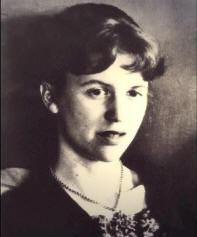Sylvia Plath’s ‘Daddy’ Experience
Alexander S. Peak
Also available in .pdf.
3 March 2003
The poem “Daddy” by Sylvia Plath delves into an unexpectedly social area of family life. The point of view that Plath provides isn’t the point of view that one would anticipate finding in a poem dedicated to one’s father; the expected point of view being one that states, “I love you, daddy.” Rather, Plath focuses her exasperation with, not only her father, but also the effect he had on her existence.
Sylvia Plath (1932–1963)
This frustration is exemplified through her expression of trepidation toward her father within the first stanza, and continues throughout. Her frustration and fear stems primarily from the type of man he was. It is here that the social aspect of the poem initially draws into play, for he is observed as a chauvinist, a bigot, a fascist, and a Nazi.
When Sylvia Plath testifies, in the ninth stanza, “I may be a bit of a Jew,” she expresses that she could never quite live up to her father’s excessively-ridged structure of acceptability. This lack of adequacy presented to her an impression that she was very detached from and, at times, unloved by her father. This sense of isolation is expressed in stanza eight through the imagery of a Jew being taken away by train to a Nazi death camp.
Within stanza eleven, she confirms her revulsion and detestation toward her father for his prejudiced ways and treatment of her. Plath achieves this by referring to him as a brute with a brute heart. The metaphors employed here are quite bleak, even in context to the rest of the poem. By saying, “So black no sky could squeak through,” she is confirming that her father is plagued with evil, plagued with racism. It is in this way, by writing this poem, that Sylvia Plath rejects, not just her upbringing, but also every convention her father, her prejudiced father, ever bestowed upon her.

